英语惯用法
英语单词惯用法(38)

英语单词惯用法(38)根据英语的搭配习惯,有些名词通常可以后接to do sth或for (doing) sth。
下面就这些名词的用法加以归纳,并配以练习进行巩固。
1、affection影响;感情;喜爱例句:I have a great affection for New York. 我很喜欢纽约。
He often shows affection to visit this city. 他经常流露出喜爱这座城市。
2、anxiety担心;渴望例句:His anxiety for knowledge is to be praised. 他对知识的渴求应该受到称赞。
In his anxiety not to offend them, he agreed to concessions. 因为怕得罪他们,他同意让步。
3、appeal恳求;呼吁;上诉;吸引力例句:His appeal for forgiveness went unanswered. 他恳请原谅,但没有得到答复。
We made an appeal to the villagers for money to build the bridge. 为建造这座桥,我们呼吁村民捐款。
4、appetite食欲;嗜好;欲望例句:Mary has no appetite for hard work. 玛丽不想干艰苦的工作。
They have the appetite to take a punt on an unproven idea. 他们有兴趣接受一个未经证实的想法。
5、arrangement 安排;约定;商议例句:We have made all the arrangements for the conference. 我们已做好会议的全部筹备工作。
They made an arrangement to meet at the school gate at 3 pm. 他们约定下午三点钟在校门口见面。
fib固定搭配和惯用法

fib固定搭配和惯用法一、引言在英语学习中,固定搭配和惯用法是掌握词汇和语法的重要环节。
其中,fib是一个常用的词汇,具有欺骗、说谎的含义。
本文将详细介绍fib的固定搭配和惯用法,帮助读者更好地理解和运用该词汇。
二、固定搭配1. tell fibs:表示“说谎、欺骗”之意,是fib的常用搭配。
例句:You can't expect her to tell the truth when she's always telling fibs.2. not to be trusted:与not连用时,表示“不可靠、不可信”之意,常用搭配为be not to be trusted。
例句:He's always trying to hide the truth, and I don't trust him not to be trusted.3. lie about:表示“对……撒谎”之意,常用搭配为lie about sth。
例句:He always lies about his income, and I don't believe a word he says.三、惯用法1. 与其他词汇组成短语,如fibbed表示过去时态,意为“撒了谎”,常用在句末。
例句:She always fibbed when she said she had a good time at the party.2. 与其他词汇组成句子时,应注意语态和时态的正确使用。
例如,当讲述过去撒谎的情况时,应使用过去完成时态,如had told fibs。
例句:I regret to say that he had told fibs about his past.3. 注意与fib相关的词汇和短语的使用,如blame、accuse等,在句子中表达对某人撒谎行为的指责和批评。
例句:Don't blame him for the lie you heard, he's known to be a fibber.四、拓展延伸除了上述固定搭配和惯用法之外,fib还可以与其他词汇组成更为复杂的短语和句子。
英语单词惯用法(1)
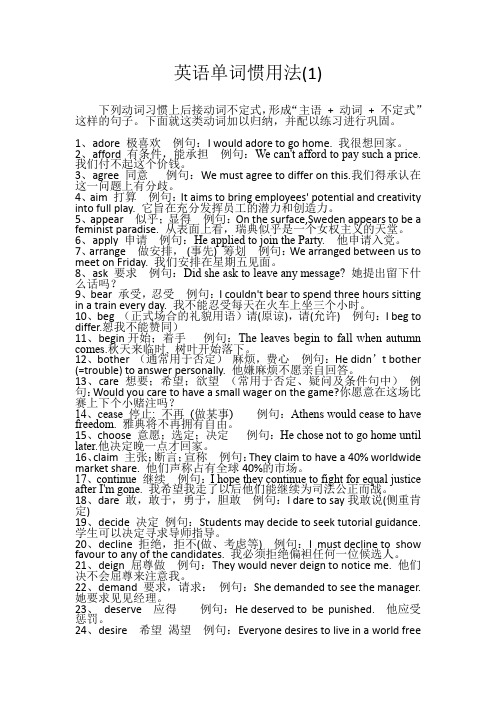
英语单词惯用法(1)下列动词习惯上后接动词不定式,形成“主语+ 动词+ 不定式”这样的句子。
下面就这类动词加以归纳,并配以练习进行巩固。
1、adore 极喜欢例句:I would adore to go home. 我很想回家。
2、afford 有条件,能承担例句:We can't afford to pay such a price.我们付不起这个价钱。
3、agree 同意例句:We must agree to differ on this.我们得承认在这一问题上有分歧。
4、aim 打算例句:It aims to bring employees' potential and creativity into full play. 它旨在充分发挥员工的潜力和创造力。
5、appear 似乎;显得例句:On the surface,Sweden appears to be a feminist paradise. 从表面上看,瑞典似乎是一个女权主义的天堂。
6、apply 申请例句:He applied to join the Party. 他申请入党。
7、arrange 做安排,(事先) 筹划例句:We arranged between us to meet on Friday. 我们安排在星期五见面。
8、ask 要求例句:Did she ask to leave any message? 她提出留下什么话吗?9、bear 承受,忍受例句:I couldn't bear to spend three hours sitting in a train every day. 我不能忍受每天在火车上坐三个小时。
10、beg (正式场合的礼貌用语)请(原谅),请(允许) 例句:I beg to differ.恕我不能赞同)11、begin开始;着手例句:The leaves begin to fall when autumn comes.秋天来临时, 树叶开始落下。
葛传椝《英语惯用法词典》摘选
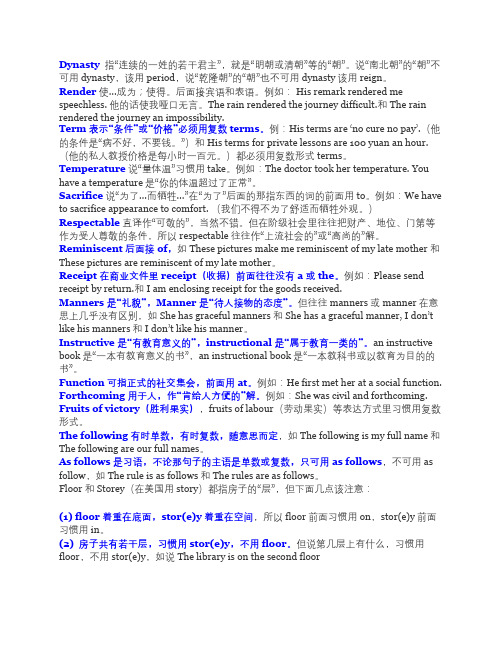
Dynasty 指“连续的一姓的若干君主”,就是“明朝或清朝”等的“朝”。
说“南北朝”的“朝”不可用dynasty,该用period,说“乾隆朝”的“朝”也不可用dynasty该用reign。
Render 使…成为;使得。
后面接宾语和表语。
例如: His remark rendered me speechless. 他的话使我哑口无言。
The rain rendered the journey difficult.和The rain rendered the journey an impossibility.Term 表示“条件”或“价格”必须用复数terms。
例:His terms are ‘no cure no pay’.(他的条件是“病不好,不要钱。
”)和His terms for private lessons are 100 yuan an hour. (他的私人教授价格是每小时一百元。
)都必须用复数形式terms。
Temperature说“量体温”习惯用take。
例如:The doctor took her temperature. You have a temperature是“你的体温超过了正常”。
Sacrifice 说“为了…而牺牲…”在“为了”后面的那指东西的词的前面用to。
例如:We have to sacrifice appearance to comfort. (我们不得不为了舒适而牺牲外观。
)Respectable 直译作“可敬的”,当然不错。
但在阶级社会里往往把财产、地位、门第等作为受人尊敬的条件,所以respectable往往作“上流社会的”或“高尚的”解。
Reminiscent 后面接of,如These pictures make me reminiscent of my late mother 和These pictures are reminiscent of my late mother。
英语常用词惯用法
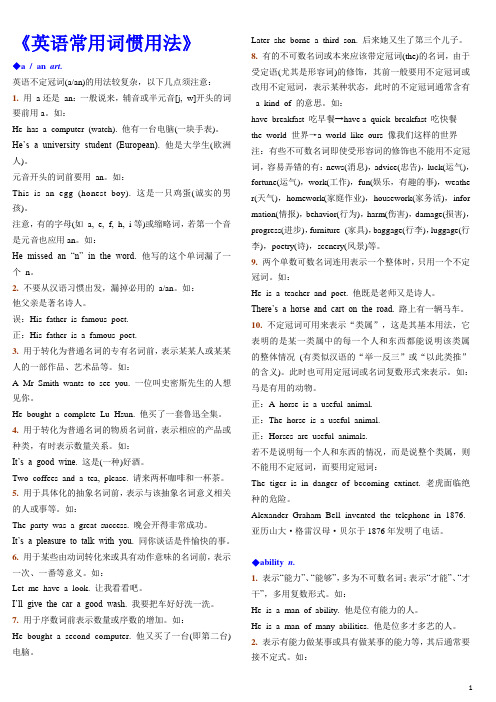
《英语常用词惯用法》◆a / an art.英语不定冠词(a/an)的用法较复杂,以下几点须注意:1.用a还是an:一般说来,辅音或半元音[j, w]开头的词要前用a。
如:He has a computer (watch). 他有一台电脑(一块手表)。
He’s a university student (European). 他是大学生(欧洲人)。
元音开头的词前要用an。
如:This is an egg (honest boy). 这是一只鸡蛋(诚实的男孩)。
注意,有的字母(如a, e, f, h, i等)或缩略词,若第一个音是元音也应用an。
如:He missed an “n” in the word. 他写的这个单词漏了一个n。
2.不要从汉语习惯出发,漏掉必用的a/an。
如:他父亲是著名诗人。
误:His father is famous poet.正:His father is a famous poet.3.用于转化为普通名词的专有名词前,表示某某人或某某人的一部作品、艺术品等。
如:A Mr Smith wants to see you. 一位叫史密斯先生的人想见你。
He bought a complete Lu Hsun.他买了一套鲁迅全集。
4.用于转化为普通名词的物质名词前,表示相应的产品或种类,有时表示数量关系。
如:It’s a good wine. 这是(一种)好酒。
Two coffees and a tea, please. 请来两杯咖啡和一杯茶。
5.用于具体化的抽象名词前,表示与该抽象名词意义相关的人或事等。
如:The party was a great success. 晚会开得非常成功。
It’s a pleasure to talk with you. 同你谈话是件愉快的事。
6.用于某些由动词转化来或具有动作意味的名词前,表示一次、一番等意义。
如:Let me have a look. 让我看看吧。
英语单词惯用法(25)

英语单词惯用法(25)英语中一些动词后是可以直接加形容词的,相当于不及物动词后接形容词,其实大部分相当于连系动词后加形容词。
在句中,句子的主语是形容词的逻辑主语,这里的形容词修饰的是主语,表示主语的状态、特征或结果。
或表示主语由一种状态变为另一状态,或表示主语保持某种状态。
下面就这些动词的用法加以归纳,并配以练习进行巩固。
1、act 假装,表现例句:The people we met looked and acted happy, pleased with life. 我们遇见的人都表现出很高兴、生活愉快的样子。
2、appear看上去,显得例句:He appeared quite well when I saw him last. 我上次见到他时,他好像(显得)很健康。
3、be是例句:The traffic on this road is very busy. 这条马路的交通很拥挤。
4、become 变为例句:Women are becoming more independent. 妇女们正在变得更加独立自主。
5、blow(被)吹动例句:The wind was beginning to blow clear. 就要风吹云散了。
6、come 变得例句:His dream of winning a gold medal has come true.他赢得金牌的梦想终于实现了。
7、continue继续保持例句:The patient continues unconscious. 病人仍然昏迷不醒。
8、fall进入某状态,变成例句:A bullet struck his head and he fell dead on the spot. 他的头部中弹,当场死亡。
9、feel 觉得例句:My coat feels wet because it is raining outside. 我的上衣摸起来是湿的,因为外面在下雨。
英语惯用法

20. Her brother is a bell-boy.
[正」她哥哥是个侍者。
21. It's yours for the asking.
[正]只要你要,它就是你的。
22. Her husband is in the dock.
[正」汽车状况良好。
15. The girl looks like a million dollars.
[正」那个女孩很动人。
16. They all stand up to the plan.
[正]他们都反对那个计划
17. The fellow is a second-story man,
[正]我弟弟特别喜爱吃巧克力。
38. We answered yes to a man.
[正]我们全体同意了:
39. It is nice and warm in the house.
[正」这房间里很暖和。
40. She gave him the lie.
[正]那个人是个夜盗。
18. He earned very little money and could hardly keep the wolf from the door
[正]他挣的钱很少,几乎不能养家糊口:
19. Don't make a fuss of them!
56. The woman dressed up to the nines.
[正]那个妇女穿着华丽的衣服。
57. The secretary talked nineteen to the dozen.
[正」秘书滔滔不绝地讲话。
英语惯用法10动词后接动名词

1.表示“保证”“使相信”或 “说服”的动词
assure, convince, persuade 等
2.表示“通知”,“告诉”, “提醒”或“警告”的动词
admonish(警告), apprise(通知), inform, notify(通知), remind, warn等 如:please apprise them of our safe arrival. Parents admonished her of the dangerous situation.
5.表示“除掉”或“摆脱”的动词
cleanse(清除), clear (清除), disabuse(去掉), disburden(去 掉), disembarrass(使解脱), ease(去 掉,使安心), exorcise(清除), purify (清除), relieve(去掉), rid(去掉), sweep(扫于) get down to (开始) pass on to (转向) plead guilty to (服罪) set one’s mind to (一心做)
with regard/ relation to (关于) with an eye/ view to (着眼于) as to (关于) in reference to (关于)
4.表示“剥夺”或“夺走”的动词 bereave(夺走), denude(剥 去), deprive(剥夺), dispossess(剥夺), divest(剥夺),shear(剥 夺), strip(剥去)等
如: The floods bereaved him of his families. They divested the king of all his power. Don’t strip the tree of its leaves.
英语惯用法倒装语序

Not only is she foolish, but also she is selfish. Seldom does she talk behind others. No sooner had we arrived than it began to rain.
3).
Here, there, now, then(然后) ,so 等副词位 于句首时,该句子习惯全 倒装。
一.句型惯用法
哪些情况下句子习惯用
倒装语序
英语中除了疑问句和感叹句
外,还有不少习惯的倒装语 序。 1). 含有否定词的短语作状 语位于句首时,该句子习惯 半倒装。
on
no condition, on no account, on no consideration, in no way, in no case, at no time, by no means,
by
no matter of means, (决不) in no circumstances, (决不) under no circumstances (决不)
no condition must you tell them the bad news. By no means should a baby be left home. In no case will she tell a lie.
如:On
2).
否定词位于句首时,该句子习 惯半倒装。
Hardly,
rarely , scarcely, seldom, little , neither , no sooner…than (一… 就), nor(也不), not(没有), not only
英语单词惯用法(39)
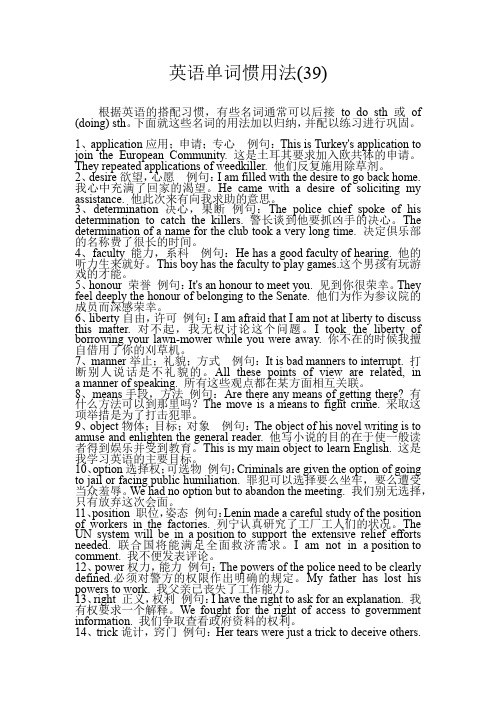
英语单词惯用法(39)根据英语的搭配习惯,有些名词通常可以后接to do sth或of (doing) sth。
下面就这些名词的用法加以归纳,并配以练习进行巩固。
1、application应用;申请;专心例句:This is Turkey's application to join the European Community. 这是土耳其要求加入欧共体的申请。
They repeated applications of weedkiller. 他们反复施用除草剂。
2、desire欲望,心愿例句:I am filled with the desire to go back home. 我心中充满了回家的渴望。
He came with a desire of soliciting my assistance. 他此次来有向我求助的意思。
3、determination 决心,果断例句:The police chief spoke of his determination to catch the killers. 警长谈到他要抓凶手的决心。
The determination of a name for the club took a very long time. 决定俱乐部的名称费了很长的时间。
4、faculty 能力,系科例句:He has a good faculty of hearing. 他的听力生来就好。
This boy has the faculty to play games.这个男孩有玩游戏的才能。
5、honour 荣誉例句:It's an honour to meet you. 见到你很荣幸。
They feel deeply the honour of belonging to the Senate. 他们为作为参议院的成员而深感荣幸。
6、liberty自由,许可例句:I am afraid that I am not at liberty to discuss this matter. 对不起,我无权讨论这个问题。
英语单词惯用法(10)
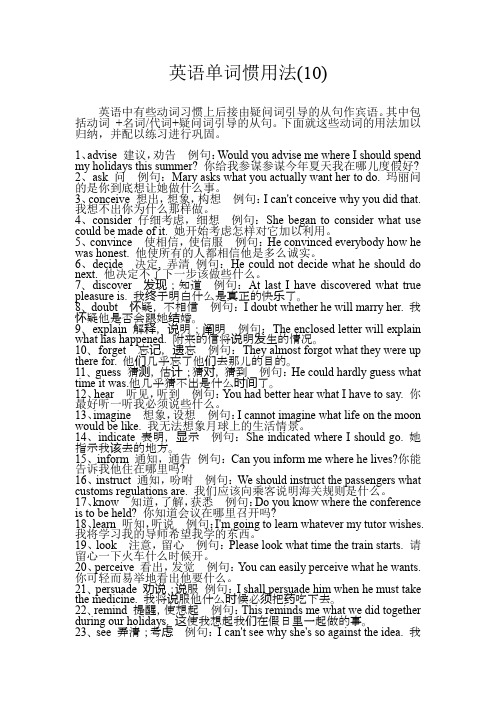
英语单词惯用法(10)英语中有些动词习惯上后接由疑问词引导的从句作宾语。
其中包括动词+名词/代词+疑问词引导的从句。
下面就这些动词的用法加以归纳,并配以练习进行巩固。
1、advise 建议,劝告例句:Would you advise me where I should spend my holidays this summer? 你给我参谋参谋今年夏天我在哪儿度假好?2、ask 问例句:Mary asks what you actually want her to do. 玛丽问的是你到底想让她做什么事。
3、conceive 想出,想象,构想例句:I can't conceive why you did that. 我想不出你为什么那样做。
4、consider 仔细考虑,细想例句:She began to consider what use could be made of it. 她开始考虑怎样对它加以利用。
5、convince 使相信,使信服例句:He convinced everybody how he was honest. 他使所有的人都相信他是多么诚实。
6、decide 决定, 弄清例句:He could not decide what he should do next. 他决定不了下一步该做些什么。
7、discover 发现;知道例句:At last I have discovered what true pleasure is. 我终于明白什么是真正的快乐了。
8、doubt 怀疑,不相信例句:I doubt whether he will marry her. 我怀疑他是否会跟她结婚。
9、explain 解释,说明;阐明例句:The enclosed letter will explain what has happened. 附来的信将说明发生的情况。
10、forget 忘记,遗忘例句:They almost forgot what they were up there for. 他们几乎忘了他们去那儿的目的。
英语语法与惯用法知识点总结
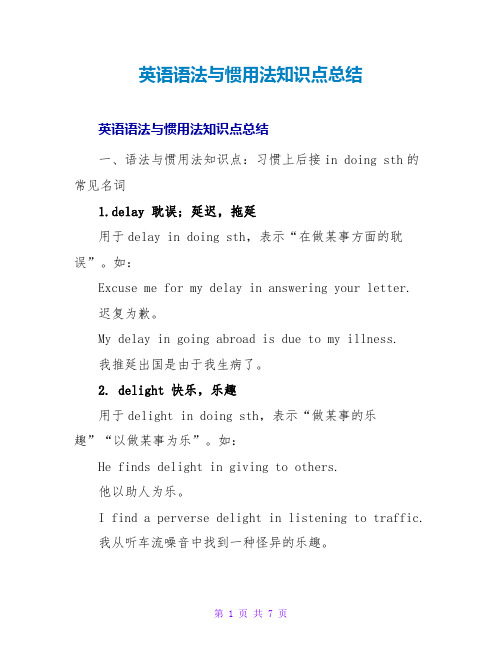
英语语法与惯用法知识点总结英语语法与惯用法知识点总结一、语法与惯用法知识点:习惯上后接in doing sth的常见名词1.delay 耽误; 延迟,拖延用于delay in doing sth,表示“在做某事方面的耽误”。
如:Excuse me for my delay in answering your letter.迟复为歉。
My delay in going abroad is due to my illness.我推延出国是由于我生病了。
2. delight 快乐,乐趣用于delight in doing sth,表示“做某事的乐趣”“以做某事为乐”。
如:He finds delight in giving to others.他以助人为乐。
I find a perverse delight in listening to traffic.我从听车流噪音中找到一种怪异的乐趣。
注意有用构造take delight in doing sth(喜欢做某事,从做某事中取乐)。
如:She took delight in teasing me.她老爱跟我开玩笑。
Now many people take delight in watching TV.如今许多人都喜欢看电视。
He takes great delight in proving others wrong.他的极大乐趣是证实别人错了。
3. harm 危害用于 harm in doing sth,表示“做某事的危害”,尤其用于no harm in doing sth构造。
如:What’s the harm in having a little fun?开点玩笑有什么不好?He may not be abl e to help but there’s no harm in asking him.他可能帮不了忙,但是求他一下倒也无妨。
The problem may not arise, but there’s no harm in keeping our powder dry.问题不一定会发生,但有备无患并无害处。
英语单词惯用法(3)
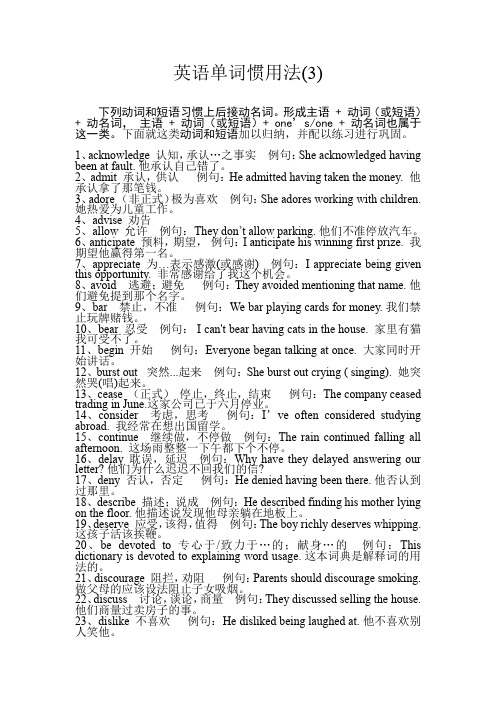
英语单词惯用法(3)下列动词和短语习惯上后接动名词。
形成主语 + 动词(或短语)+ 动名词,主语 + 动词(或短语)+ one’s/one + 动名词也属于这一类。
下面就这类动词和短语加以归纳,并配以练习进行巩固。
1、acknowledge 认知,承认…之事实例句:She acknowledged having been at fault.他承认自己错了。
2、admit 承认,供认例句:He admitted having taken the money. 他承认拿了那笔钱。
3、adore (非正式)极为喜欢例句:She adores working with children. 她热爱为儿童工作。
4、advise 劝告5、allow 允许例句:They don’t allow parking.他们不准停放汽车。
6、anticipate 预料,期望,例句:I anticipate his winning first prize. 我期望他赢得第一名。
7、appreciate 为…表示感激(或感谢) 例句:I appreciate being given this opportunity. 非常感谢给了我这个机会。
8、avoid 逃避;避免例句:They avoided mentioning that name.他们避免提到那个名字。
9、bar 禁止,不准例句:We bar playing cards for money.我们禁止玩牌赌钱。
10、bear 忍受例句:I can't bear having cats in the house. 家里有猫我可受不了。
11、begin 开始例句:Everyone began talking at once. 大家同时开始讲话。
12、burst out 突然...起来例句:She burst out crying ( singing). 她突然哭(唱)起来。
英语词汇惯用法
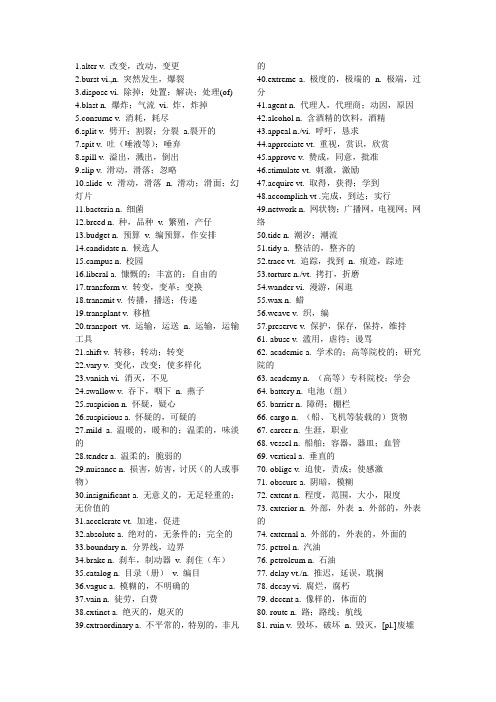
1.alter v. 改变,改动,变更2.burst vi.,n. 突然发生,爆裂3.dispose vi. 除掉;处置;解决;处理(of)4.blast n. 爆炸;气流vi. 炸,炸掉5.consume v. 消耗,耗尽6.split v. 劈开;割裂;分裂a.裂开的7.spit v. 吐(唾液等);唾弃8.spill v. 溢出,溅出,倒出9.slip v. 滑动,滑落;忽略10.slide v. 滑动,滑落n. 滑动;滑面;幻灯片11.bacteria n. 细菌12.breed n. 种,品种v. 繁殖,产仔13.budget n. 预算v. 编预算,作安排14.candidate n. 候选人15.campus n. 校园16.liberal a. 慷慨的;丰富的;自由的17.transform v. 转变,变革;变换18.transmit v. 传播,播送;传递19.transplant v. 移植20.transport vt. 运输,运送n. 运输,运输工具21.shift v. 转移;转动;转变22.vary v. 变化,改变;使多样化23.vanish vi. 消灭,不见24.swallow v. 吞下,咽下n. 燕子25.suspicion n. 怀疑,疑心26.suspicious a. 怀疑的,可疑的d a. 温暖的,暖和的;温柔的,味淡的28.tender a. 温柔的;脆弱的29.nuisance n. 损害,妨害,讨厌(的人或事物)30.insignificant a. 无意义的,无足轻重的;无价值的31.accelerate vt. 加速,促进32.absolute a. 绝对的,无条件的;完全的33.boundary n. 分界线,边界34.brake n. 刹车,制动器v. 刹住(车)35.catalog n. 目录(册)v. 编目36.vague a. 模糊的,不明确的37.vain n. 徒劳,白费38.extinct a. 绝灭的,熄灭的39.extraordinary a. 不平常的,特别的,非凡的40.extreme a. 极度的,极端的n. 极端,过分41.agent n. 代理人,代理商;动因,原因42.alcohol n. 含酒精的饮料,酒精43.appeal n./vi. 呼吁,恳求44.appreciate vt. 重视,赏识,欣赏45.approve v. 赞成,同意,批准46.stimulate vt. 刺激,激励47.acquire vt. 取得,获得;学到48.accomplish vt .完成,到达;实行work n. 网状物;广播网,电视网;网络50.tide n. 潮汐;潮流51.tidy a. 整洁的,整齐的52.trace vt. 追踪,找到n. 痕迹,踪迹53.torture n./vt. 拷打,折磨54.wander vi. 漫游,闲逛55.wax n. 蜡56.weave v. 织,编57.preserve v. 保护,保存,保持,维持61. abuse v. 滥用,虐待;谩骂62. academic a. 学术的;高等院校的;研究院的63. academy n. (高等)专科院校;学会64. battery n. 电池(组)65. barrier n. 障碍;棚栏66. cargo n. (船、飞机等装载的)货物67. career n. 生涯,职业68. vessel n. 船舶;容器,器皿;血管69. vertical a. 垂直的70. oblige v. 迫使,责成;使感激71. obscure a. 阴暗,模糊72. extent n. 程度,范围,大小,限度73. exterior n. 外部,外表a. 外部的,外表的74. external a. 外部的,外表的,外面的75. petrol n. 汽油76. petroleum n. 石油77. delay vt./n. 推迟,延误,耽搁78. decay vi. 腐烂,腐朽79. decent a. 像样的,体面的80. route n. 路;路线;航线81. ruin v. 毁坏,破坏n. 毁灭,[pl.]废墟82. sake n. 缘故,理由83. satellite n. 卫星84. scale n. 大小,规模;等级;刻度85. temple n. 庙宇86. tedious a. 乏味道,单调的,87. tend vi.易于,趋向88. tendency n.趋向,趋势89. ultimate a. 极端的,最大的,最终的n. 极端90. undergo v. 经历,遭受91. abundant a. 丰富的,充裕的,大量的92. adopt v. 收养;采用;采纳93. adapt vi. 适应,适合;改编,改写vt. 使适应94. bachelor n. 学士,学士学位;单身汉95. casual a. 偶然的,碰巧的;临时的;非正式的96. trap n. 陷阱,圈套v. 设陷阱捕捉97. vacant a. 空的,未占用的98. vacuum n. 真空,真空吸尘器99. oral a. 口头的,口述的,口的100. optics n. (单、复数同形)光学101. organ n. 器官,风琴102. excess n. 过分,过量,过剩103. expel v. 驱逐,开除,赶出104. expend v. 消费105. expenditure n. 支出,消费;经费106. expense n. 开销,费用107. expensive a. 花钱多的;价格高贵的108. expand v. 扩大,扩张;展开,膨胀109. expansion n. 扩大,扩充;发展,膨胀110. private a. 私人的,个人的111. individual a. 个别的,单独的n. 个人,个体112. personal a. 个人的,私人的;亲自的114. personnel n. [总称]人员,员工;人事部门115. the Pacific Ocean 太平洋116. the Atlantic Ocean 大西洋117. the Arctic Ocean 北冰洋118. the Antarctic Ocean 南冰洋119. grant vt. 授予,同意,准予119. grand a. 宏伟大,壮丽的,重大的120. invade v. 侵入,侵略,侵袭121. acid n. 酸,酸性物质a. 酸的;尖刻的122. acknowledge v. 承认;致谢123. balcony n. 阳台124. calculate vt. 计算,核算125. calendar n. 日历,月历126. optimistic a. 乐观127. optional a. 可以任选的,非强制的128. outstanding a. 杰出的,突出的,显著的129. export n. 出口(物)v. 出口,输出130. import n. 进口(物)v. 进口,输入131. impose vt. 把...加强(on);采用,利用132. religion n. 宗教,宗教信仰133. religious a. 宗教的134. victim n. 牺牲品,受害者135. video n. 电视,视频a. 电视的,录像的136. videotape n. 录像磁带v. 把...录在录像带上137. offend v. 冒犯,触犯138. bother v. 打搅,麻烦139. interfere v. 干涉,干扰,妨碍140. internal a. 内部的,国内的141. beforehand ad. 预先,事先142. racial a. 人种的种族的143. radiation n. 放射物,辐射144. radical a.根本的;激进的145. range n. 幅度,范围v. (在某范围内)变动146. wonder n. 惊奇,奇迹v. 想知道,对...感到疑惑147. isolate vt. 使隔离,使孤立148. issue n. 问题,争论点;发行,(报刊)一期149. hollow a. 空的,中空的,空虚道150. hook n. 钩vt. 钩住151. adequate a. 适当地;足够152. adhere vi. 粘附,附着;遵守,坚持153. ban vt. 取缔,禁止154. capture vt. 俘虏,捕获155. valid a. 有效的,有根据的;正当的156. valley n. 山谷,峡谷157. consistent a. 坚固定;一致的,始终如一的158. continuous a. 继续的,连续(不断)的159. continual a. 不断地,频繁的160. explode v. 爆炸;爆发;激增161. exploit v. 剥削;利用,开采162. explore v. 勘探163. explosion n. 爆炸;爆发;激增164. explosive a. 爆炸的;极易引起争论的165. remote a. 遥远的,偏僻的166. removal n. 除去,消除167. render vt. 使得,致使168. precaution n. 预防,防备,警惕169. idle a. 懒散的,无所事事的170. identify vt. 认出,鉴定171. identify n. 身份;个性,特性172. poverty n. 贫穷173. resistant a. (to)抵抗的,抗...的,耐...的174. resolve vt. 解决;决定,决意175. barrel n. 桶176. bargain n. 便宜货vi. 讨价还价177. coarse a. 粗的,粗糙的,粗劣的178. coach n. 教练;长途公共汽车179. code n. 准则,法规,密码180. coil n. 线圈v. 卷,盘绕181. adult n. 成年人182. advertise v. 为...做广告183. advertisement n. 广告184. agency n. 代理商,经销商185. focus v. (使)聚集n. 焦点,中心,聚焦186. forbid vt. 不许,禁止187. debate n./v. 辩论,争论188. debt n. 欠债189. decade n. 十年190. enclose vt. 围住;把...装入信封191. encounter vt./n. 遭遇,遭到192. globe n. 地球,世界;地球仪193. global a. 全球的;总的194. scan vt. 细看;扫描;浏览195. scandal n. 丑事,丑闻196. significance n. 意义;重要性197. subsequent a. 随后的,后来的198. virtue n. 美德,优点199. virtual a. 实际上的,事实上的200. orient vt. 使适应,(to,toward)使朝向n. 东方167. render 解释比较长,可要仔细体会啊!1) render sth (for sth);render sth (to sb) give sth in return,or exchange,or as sth which is due 给予某物作为报偿或用以交换;回报;归还render homage,obedience,allegiance,etc.表示敬意、顺从、效忠等:a reward for services rendered 服务的酬金render good for evil 以德报怨render insult for insult 以侮辱对侮辱render sb a service/render a service to sb 为某人服务render help to disaster victims 向灾民提供援助render thanks to God 感谢上帝2) present or send in (an account)for payment 递交或开出(帐单):account rendered 开出50美元的帐单3) cause (sb/sth) to be in a certain condition 使(某人[某事物])处于某种状况:rendered helpless by an accident 因出事故而束手无策Your action had rendered our contract invalid.你们的这种做法导致双方的合同失败。
英语词汇中的固定搭配与惯用法
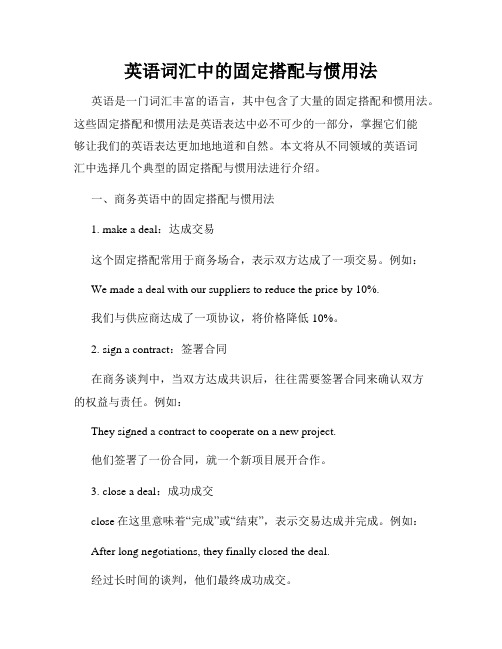
英语词汇中的固定搭配与惯用法英语是一门词汇丰富的语言,其中包含了大量的固定搭配和惯用法。
这些固定搭配和惯用法是英语表达中必不可少的一部分,掌握它们能够让我们的英语表达更加地地道和自然。
本文将从不同领域的英语词汇中选择几个典型的固定搭配与惯用法进行介绍。
一、商务英语中的固定搭配与惯用法1. make a deal:达成交易这个固定搭配常用于商务场合,表示双方达成了一项交易。
例如:We made a deal with our suppliers to reduce the price by 10%.我们与供应商达成了一项协议,将价格降低10%。
2. sign a contract:签署合同在商务谈判中,当双方达成共识后,往往需要签署合同来确认双方的权益与责任。
例如:They signed a contract to cooperate on a new project.他们签署了一份合同,就一个新项目展开合作。
3. close a deal:成功成交close在这里意味着“完成”或“结束”,表示交易达成并完成。
例如:After long negotiations, they finally closed the deal.经过长时间的谈判,他们最终成功成交。
二、医学英语中的固定搭配与惯用法1. take one's temperature:量体温在医学英语中,常用这个固定搭配来表示测量体温的行为。
例如:I feel a bit sick, can you take my temperature for me?我感觉有点不舒服,你能帮我量一下体温吗?2. prescribe medication:开药方医生在诊断病情之后往往会开具药方,指导患者服用适当的药物。
例如:The doctor prescribed some medication for my cough.医生给我开了一些用于咳嗽的药物。
英语单词惯用法(49)

英语单词惯用法(49)英语中有些形容词常作表语,习惯上后接介词,构成:主语+ be +adj + 介词+ (doing) sth句型。
同一个形容词后接不同的介词,意思也就不同。
下面就这些词的用法加以归纳,并配以练习进行巩固。
1、①be afraid for sb/ sth 为…担心例句:He is afraid for himself. 他总是提心吊胆的。
①be afraid of sb/ sth 害怕…例句:The little girl is afraid of that policeman. 那小女孩怕那个警察。
2、①be angry with sb 对某人生气例句:I am angry with you for your conduct. 你的行为使我生气。
①be angry about sth 对或因某事生气例句:She often got angry about many foolish things. 她常为许多蠢事而生气。
①be angry at sth 例句:We were angry at the boys for their tardiness. 我们对那些男孩行动迟缓很生气。
①be angry for sth 例句:He is angry for trifles. 他为一些琐事而生气。
①be angry over sth 例句:Don't be angry over such trivial matters. 别为这些琐事生气。
3、①be anxious about sth 为…焦虑例句:I'm very anxious about the speech contest. 我对此次演讲比赛十分忧虑。
①be anxious at sth为…焦虑例句:They became anxious at her delay. 他们对她的耽搁渐渐感到不安了。
①be anxious for sth/ sb为…焦虑例句:He was anxious for the safety of his money. 他替他的钱的安全担心。
英语单词惯用法(7)
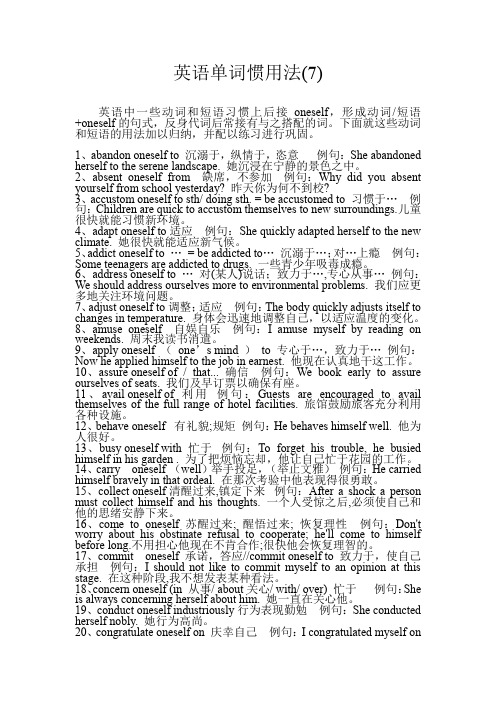
英语单词惯用法(7)英语中一些动词和短语习惯上后接oneself,形成动词/短语+oneself的句式,反身代词后常接有与之搭配的词。
下面就这些动词和短语的用法加以归纳,并配以练习进行巩固。
1、abandon oneself to 沉溺于,纵情于,恣意例句:She abandoned herself to the serene landscape. 她沉浸在宁静的景色之中。
2、absent oneself from 缺席,不参加例句:Why did you absent yourself from school yesterday? 昨天你为何不到校?3、accustom oneself to sth/ doing sth. = be accustomed to 习惯于…例句:Children are quick to accustom themselves to new surroundings.儿童很快就能习惯新环境。
4、adapt oneself to适应例句:She quickly adapted herself to the new climate. 她很快就能适应新气候。
5、addict oneself to …= be addicted to…沉溺于…;对…上瘾例句:Some teenagers are addicted to drugs. 一些青少年吸毒成瘾。
6、address oneself to …对(某人)说话;致力于…,专心从事…例句:We should address ourselves more to environmental problems. 我们应更多地关注环境问题。
7、adjust oneself to调整;适应例句:The body quickly adjusts itself to changes in temperature. 身体会迅速地调整自己,以适应温度的变化。
英语单词惯用法(6)

英语单词惯用法(6)下面这些动词和短语习惯上后接“to+动名词”,形成固定的句式。
下面就这些动词和短语的用法加以归纳,并配以练习进行巩固。
1、adapt to doing sth 适应做某事例句:He has adapted to doing that work. 他已经适应做那件工作。
2、admit to doing sth承认做了某事例句:George would never admit to being wrong. 乔治从不认错。
3、amount 意思是做某事,等同于做某事例句:Borrowing money and not returning it amounts to stealing. 借了钱不还就等于偷。
4、apply oneself to doing sth专心致力于做某事例句:They applied themselves to producing bikes. 他们努力生产自行车。
5、apply to doing sth适用于做某事例句:These principles apply to learning maths. 这些原则适用于数学学习。
6、pay attention to doing sth注意做某事例句:Our teachers always pay attention to combining theory with practice. 我们的老师总是注意理论联系实际。
7、contribute to doing sth 促成/有助于做某事例句:Laissez-faire policy result in increase economic activity, but contribute to rising in import. 自由放任政策导致经济活动的增加,但也促进了进口的增长。
8、descend to doing sth 转而提到/堕落到做某事例句:All too soon they will descend to spreading scandal and gossip. 过不了多久他们就会堕落到传播丑闻和谣言的地步。
- 1、下载文档前请自行甄别文档内容的完整性,平台不提供额外的编辑、内容补充、找答案等附加服务。
- 2、"仅部分预览"的文档,不可在线预览部分如存在完整性等问题,可反馈申请退款(可完整预览的文档不适用该条件!)。
- 3、如文档侵犯您的权益,请联系客服反馈,我们会尽快为您处理(人工客服工作时间:9:00-18:30)。
For BDCOL Students
Plurality, Possessiveness, at al.
• It’s means “it is,” while its means “belongs to it.” Its’ is not a word at all.
•
It’s only a lot of reading if you do it.
• Similarly, there is no apostrophe in the possessives theirs, ours, hers, or yours.
•
Yours, Mine, and Ours is not my favorite movie, but it is hers.
•
Focusing exclusively on target selection begs the question of
why we are bombing at all.
•
Your conclusions raise an interesting question: would
Linebacker II have worked in 1968?
• People do not try and do things, they try to do them. Try to remember this.
•
The Pave Tack is down, so we’ll have to try to bomb visually.
•
Please try not to embarrass me in front of the IG team this time.
•
The exploding Titan hurled its warhead farther than CINCSAC would have liked.
•
It’s easy to see how the F-15 got its nickname “Rodan.”
•
The ABL program will be a fiasco unless its power problems can be solved.
•
Their promotion criteriaห้องสมุดไป่ตู้seemed mainly to involve alcohol tolerance and family
influence.
•
In effect, Schelling said that with nuclear weapons, the medium is the message.
•
The media have blown my role in the food fight completely out of proportion.
•
Lt. Cdr. Data is a medium, but Lt. Worf is an extra large.
More on plurals
already end in s (except for Jesus or ancient Greek or
Roman names ending in -is or -es).
•
•
He said he believed in states’ rights, but he was
vague about what he meant by that.
•
Strauss’s “Also Sprach Zarathustra” became one of
Elvis’s trademarks.
•
The AWACS’s lack of defensive systems may be its
Achilles’ heel.
Miscellaneous Pet Peeves
came here.
• Data, media and criteria are plural words (though treating “data” as singular gets more common all the time and is widely accepted now; it’s so sad). One data point is a datum; television or sand painting is a medium, and one of a set of criteria is a
• To beg a question means to evade it or to pretend that it has already been answered, it does not mean to raise it. This is a very common error. To say someone is begging a question is a criticism.
criterion.
•
These data are presented in an unnecessarily confusing way.
•
Force protection should not be the only criterion for judging military success.
• Plural nouns which end in “s” are made into possessive
adjectives by adding an apostrophe. Singular nouns are normally made possessive by adding ’s, even if they
•
As usual, the error was theirs, but we were blamed for it.
•
There’s a subtle perfection in everything I do.
•
Gertrude Stein said of Oakland, “There’s no there there.” I guess she never
